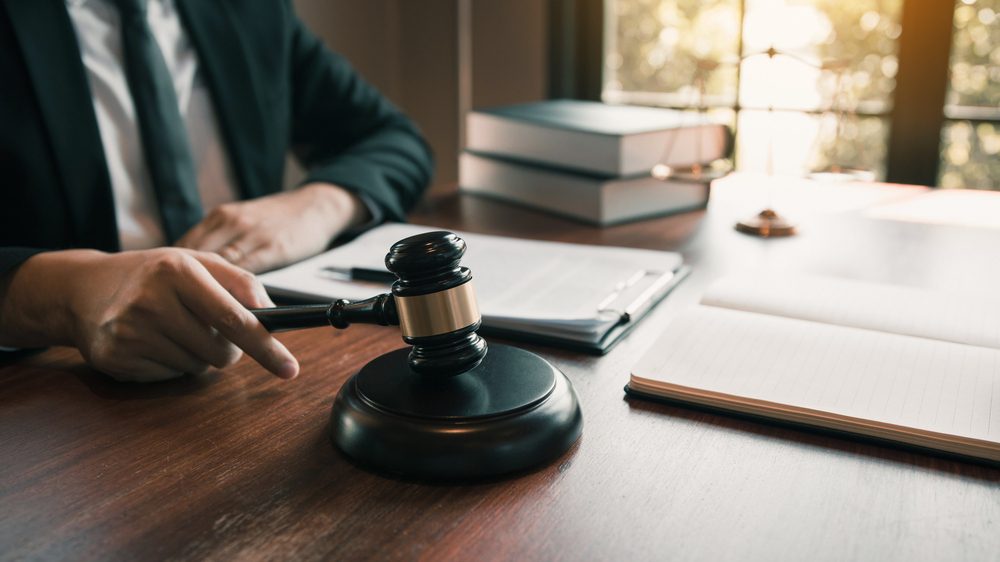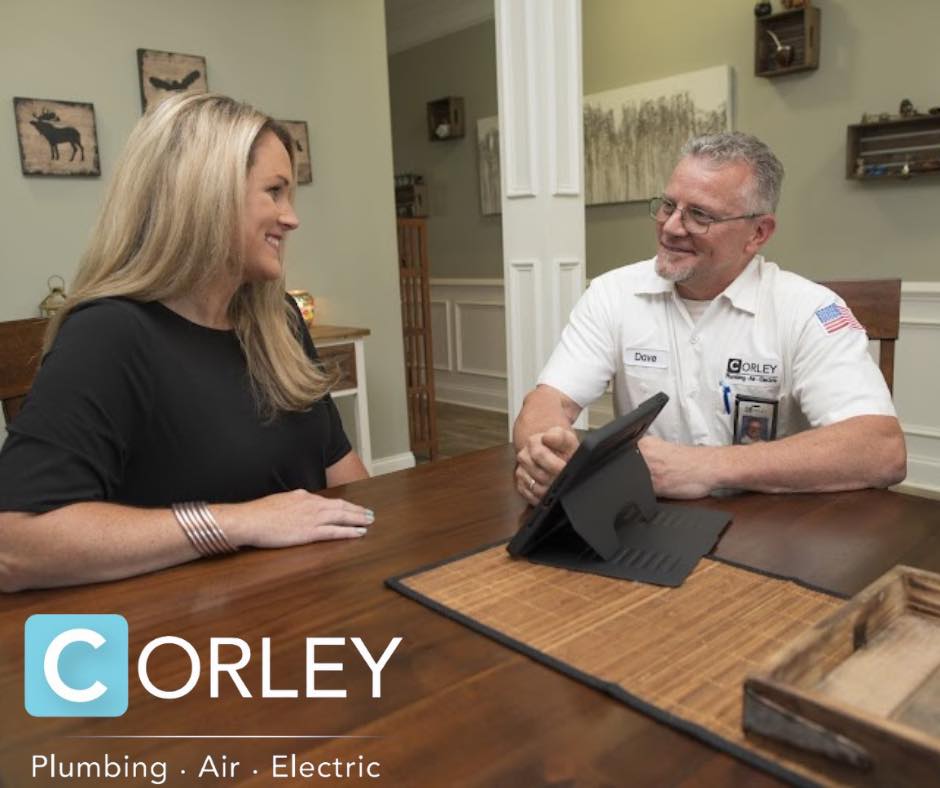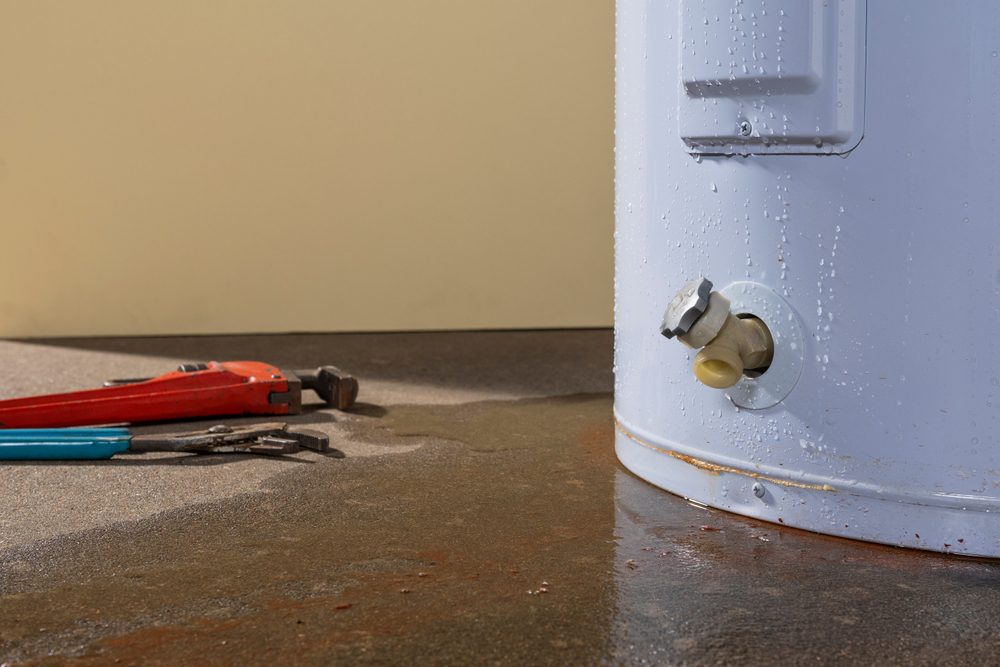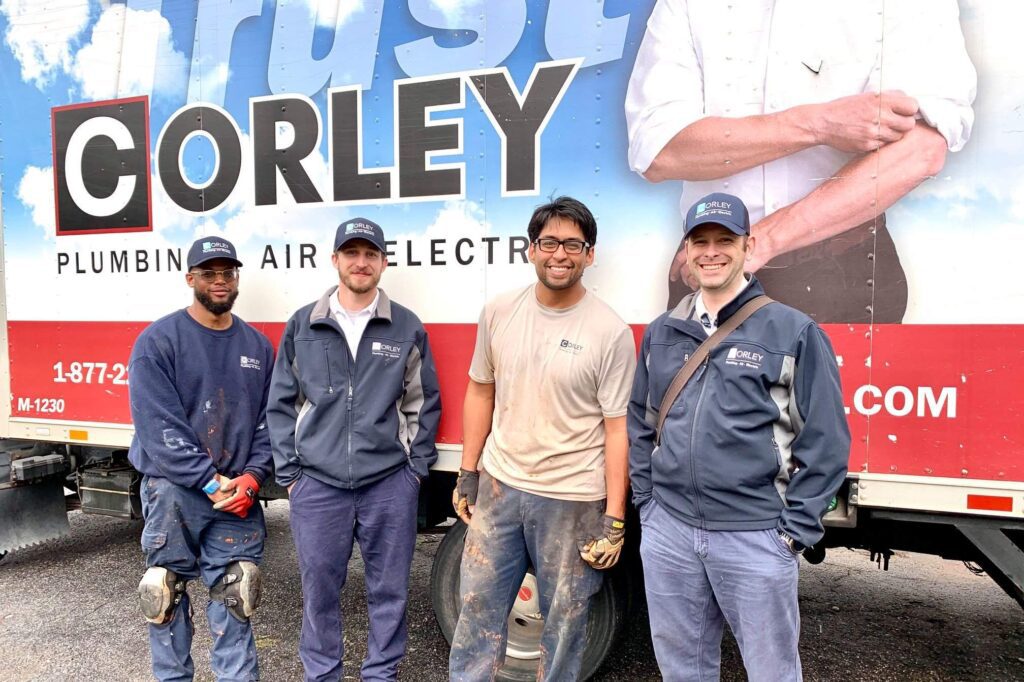Power outages can disrupt your daily routine, from keeping your lights on to ensuring your home remains comfortable and safe. Whether caused by storms, grid failures, or unforeseen issues, losing electricity can affect everything from your appliances to your security. That’s why having a backup generator can provide peace of mind, ensuring your home stays powered, and your life remains uninterrupted.
At Corley Plumbing Air Electric, we understand how important it is to keep your home running smoothly, no matter the circumstances. With years of experience serving Upstate South Carolina, we pride ourselves on delivering dependable home services with integrity and professionalism. When you choose Corley, you don’t just get a generator—you gain peace of mind, knowing that your home’s needs are in the hands of a trusted partner.
Here’s a guide to choosing the right generator for your home, backed by Corley’s commitment to “You can TRUST Corley” and our promise of total home comfort.
Step 1: Assess What You Want to Power
The first step in choosing the right generator for your home is understanding what you need to power during an outage. Some homes only require basic appliances, while others need more extensive systems to keep everything running smoothly.
Powering the Essentials
If you’re concerned about keeping only the essentials running, such as the refrigerator, lights, internet router, and sump pump, a smaller generator may suffice.
Benefits:
- Lower initial cost
- Quieter operation
- Simpler installation
Ideal for:
- Short-term power outages
- Smaller homes or apartments
- Budget-conscious homeowners
Full Home Power
For homes with larger energy needs or longer outages, a whole-home generator is the better option. These systems provide backup power for everything in your home, including HVAC systems, lighting, appliances, and electronics.
Ideal for:
- Larger homes with higher energy consumption
- Families requiring power for medical equipment
- Homes with home offices that demand reliable power
Step 2: Choose the Right Fuel Type
Generators come in various fuel options, each offering different benefits depending on the availability of fuel and your home’s energy needs.
Natural Gas
- Pros: Always available, connects directly to your home’s existing gas line, low maintenance
- Best for: Homes with a natural gas connection, homeowners seeking convenience and reliability
- Environmental Impact: Clean-burning, eco-friendly
Propane
- Pros: Stored in tanks, efficient, and clean-burning
- Best for: Off-grid homes or properties not connected to natural gas
- Ideal For: Homeowners who want flexibility and reliability in their energy source
Diesel
- Pros: Highly fuel-efficient
- Best for: Larger homes with heavy energy needs or in rural areas
- Considerations: Requires storage and periodic maintenance
Step 3: Understand the Installation Process
Proper installation is critical to ensuring your generator meets your home’s power requirements efficiently and safely. Here’s what to expect during the installation process:
In-Home Assessment
Before installation, a professional will assess your home’s power needs. This ensures that the generator’s size and fuel type align with your household’s specific requirements.
Permitting and Compliance
Local permits and safety codes must be followed when installing a generator. A licensed professional ensures the installation is compliant with all regulations, ensuring both safety and functionality.
Expert Installation
Our certified technicians will handle the entire installation, from connecting the generator to your home’s electrical system to performing thorough testing. With the Corley “You can TRUST Corley” promise, you can rest easy knowing your generator is installed for optimal performance.
Why Choose a Standby Generator Over a Portable One?
Portable generators are a common choice for backup power, but they come with limitations that make standby generators a superior choice for most homeowners.
Advantages of Standby Generators:
- Automatic Activation: Standby generators automatically power up within seconds of an outage, meaning no manual effort on your part.
- Safety: Permanently installed outside, these systems reduce risks like carbon monoxide poisoning or fire hazards.
- Reliability: Standby generators are integrated into your home’s electrical system, ensuring continuous power without needing refueling.
With a standby generator, you can enjoy seamless protection without the worry of manually switching on or maintaining the system during an outage.
Generator FAQs
How much does a whole-home generator cost?
The cost for a whole-home generator typically ranges between $5,000 and $15,000, depending on size, fuel type, and installation complexities. At Corley, we believe in transparent pricing—no surprises, just honest, upfront costs.
How long can a generator run during an outage?
- Natural Gas Generators: These will run as long as the gas supply remains active.
- Propane and Diesel Generators: These can last anywhere from 24 to 72 hours, depending on fuel tank size and energy demand.
Will a generator power my entire house?
Yes! A properly sized whole-home generator can power all your essential systems—HVAC, lighting, appliances, and more—without interruptions. Our team ensures your generator meets your exact power needs.
Do generators need maintenance?
Yes, just like any mechanical system, regular maintenance is crucial to ensure peak performance when you need it most. Corley recommends annual inspections and service to keep your generator in top condition and ready to go at all times.
Why Trust Corley Plumbing Air Electric?
When you choose Corley, you're choosing a partner you can rely on for more than just a generator installation. Our team is committed to ensuring your home remains comfortable, safe, and fully powered when you need it most. We offer total home comfort through expert solutions, fast and reliable service, and a customer-first approach. Here’s what sets us apart:
- Expert Solutions: Our highly trained professionals deliver the best results, whether it’s a generator installation or maintenance.
- Fast & Reliable: We know that time is valuable, which is why we prioritize fast response times and efficient service.
- Customer First: At Corley, we make sure you’re fully informed and satisfied throughout every step of the process.
- Trusted Partnership: We’re not just here for the one-time fix—we aim to be your go-to for all your home’s needs, providing lasting support.
Get Ready for the Next Power Outage
Power outages can happen unexpectedly, but with Corley, you can rest assured that your home will stay comfortable, safe, and fully powered. As a trusted local expert, we are dedicated to providing solutions tailored to your home’s unique needs.
Don’t wait for the next outage to cause disruptions—contact Corley Plumbing Air Electric today to schedule a consultation. Let us help you find the ideal backup power solution, and give you the peace of mind you deserve.
With Corley, you’re more than a customer—you’re a valued partner. Let us help you keep your home running smoothly and comfortably, no matter what comes your way. You can TRUST Corley.
In the realm of home repairs and renovations, the temptation to save a few bucks by hiring an inexperienced or or bad contractor can be strong. After all, they often advertise lower rates compared to licensed plumbers and electricians.
However, as many homeowners have unfortunately discovered, the initial savings can quickly evaporate in the face of shoddy workmanship, safety hazards, and costly repairs down the line.
The Real Cost of Hiring Bargain Contractors
1. Quality of Work
Inexperienced handymen and unlicensed electricians may lack the skills and expertise necessary to perform tasks correctly. Poor workmanship can lead to subpar results that not only look unprofessional but also fail to meet safety standards and could violate state and local code requirements.
From improperly installed electrical wiring to botched plumbing repairs, the consequences of substandard work can be far-reaching and expensive to rectify.
2. Safety Risks
Electrical work, in particular, poses significant safety risks when performed by untrained individuals. Faulty wiring, improper grounding, and overloaded circuits can increase the likelihood of electrical fires, shocks, and other hazards.
The absence of proper permits and inspections further compounds these risks, leaving homeowners liable for any accidents or injuries that occur due to non-compliance with building codes.

3. Legal and Financial Consequences
Hiring bad plumbers and contractors may seem like a cost-effective solution, but it can have serious legal and financial repercussions. In many jurisdictions, contractors are required to hold valid licenses and insurance coverage to operate legally.
Failure to comply with these regulations can result in fines, penalties, and even legal action. Moreover, homeowners may find themselves liable for any damages or injuries caused by unlicensed workers on their property.
4. Warranty and Liability Issues
Licensed contractors typically offer warranties or guarantees on their workmanship, providing homeowners with peace of mind and recourse in the event of problems.
In contrast, unlicensed handymen and electricians may not offer any form of warranty, leaving homeowners responsible for any issues that arise after the job is completed. This lack of accountability can leave homeowners footing the bill for air conditioning repairs, replacements, and other types of projects.
Read More: What is a Water Heater Drain Pan? Advantages and Issues
5. Long-Term Costs
While hiring a licensed professional may seem more expensive upfront, it can save homeowners money in the long run. Quality workmanship and adherence to safety standards reduce the likelihood of costly repairs, replacements, and accidents down the line.
Additionally, licensed contractors are often more efficient and knowledgeable, completing projects in a timely manner and minimizing disruption to the household.
Hiring Unlicensed Contractors and Electricians is Not Worth the Risk
When it comes to home repairs and renovations, cutting corners by hiring bad contractors and electricians is a gamble that rarely pays off. The potential savings are overshadowed by the risks of poor workmanship, safety hazards, and legal liabilities.
Investing in a licensed professional may cost more initially, but it offers peace of mind, quality assurance, and long-term savings in the form of reliable, safe, and compliant workmanship. In the end, the real cost of hiring an inexperienced or unlicensed contractor is far greater than the money saved upfront.

Professional Plumbing, HVAC, and Electrical Services
With over 40 years of experience in the home service trades, thousands of hours of continuous training, and capital investments in the latest technology, the team of professionals at Corley can give customers peace of mind in a job well done for years to come.
Our team offers reputable plumbing, electrical, and HVAC repair services for homeowners in Greenville and Upstate South Carolina. From water heater repairs, lighting installation, air conditioning replacement, to drain cleaning, our staff is available to support you.
Partner with your local licensed Corley technicians to experience professional service from those who know your home best, who make certain your home is safe and functioning as it should for years to come! Call our professionals at (864) 517-1251 to receive assistance.
A water heater drain pan is an essential component in any plumbing system, offering protection against water damage by capturing leaks to prevent overflow. A water heater drip pan is versatile and suitable for traditional and tankless water heaters. When properly utilized and maintained, drain pans play a vital role in safeguarding properties against water-related emergencies.
What is a Water Heater Drain Pan?
A water heater drain pan is a shallow metal or plastic container designed to catch leaks or overflow from a water heater. These pans are installed beneath water heaters to:
- Contain leaks or overflow
- Prevent water damage
- Serve as a visual indicator of an underlying problem
Top Types of Setups
Water heater drain pans come in various types and setups, each tailored to specific plumbing configurations and installation requirements.
What is a floor-mounted drain pan?
These are the most basic type of drain pans and are typically installed directly beneath the water heater on the floor.
What is a wall-mounted drain pan?
When space is limited or floor drainage is impractical, wall-mounted drain pans are installed on the wall behind the water heater.
What is a overhead drain pan?
These drain pans are installed above the water heater and are often used in commercial or industrial settings where floor space is at a premium.
What is a combination drain pan?
Some drain pans are designed to serve multiple functions, such as combining a drain pan with a condensate drain line for tankless water heaters or HVAC systems.

Early Indicators of Issues
Recognizing early signs of potential problems with water heater drain pans is crucial for preventing extensive damage and costly repairs.
- Pooling water: If water accumulates in the drain pan, it could indicate a leak or overflow from the water heater.
- Rust or corrosion: Corrosion or rust spots on the drain pan may indicate deterioration of the material, potentially compromising its effectiveness in containing leaks.
- Cracks or damage: Visible cracks or damage to the drain pan can compromise its structural integrity and ability to contain leaks.
- Moisture or mold: Moisture or mold growth around the drain pan area could signal a persistent leak that requires immediate attention.
Read More: What Are the Hidden Costs of Working With a Bad Electrician or Contractor?
How to Install a Water Heater Drip Pan
Installing a water heater drip pan is a straightforward process that can be completed by following a few simple steps:
- Select the appropriate size and type: Begin by choosing a drip pan that matches the dimensions of your water heater and meets any specific requirements, such as material or configuration.
- Prepare the installation area: Clear the area beneath the water heater and ensure it is clean and free from debris.
- Position the drip pan: Place the drip pan directly beneath the water heater, ensuring it is centered and level.
- Secure the drip pan: Depending on the type of drip pan, secure it in place using appropriate fasteners or adhesive. Ensure the drip pan is firmly attached to prevent movement or displacement.
- Connect the drain line (if applicable): If the drip pan includes a drain line, connect it to an appropriate drainage system to safely dispose of captured water. Ensure the drain line is properly installed and free of obstructions.
- Test for leaks: Once the drip pan is installed, perform a test to ensure it effectively captures any leaks or overflow from the water heater.
Why Do I Have Water in My Water Heater Drain Pan? 5 Reasons and Ways to Respond
Water heater drain pans identify several common reasons why water may accumulate in the drain pan:
1. Pressure Relief Valve Leakage
If the pressure relief valve on the water heater is faulty or experiencing excess pressure, it may release water into the drain pan as a safety measure. This indicates a potential issue with the water heater's pressure regulation system that requires attention.
2. Corrosion Or Deterioration
Over time, the water heater's tank or components may corrode or deteriorate, leading to leaks that result in water accumulation in the water heater drain pan. Regular inspection and maintenance are essential to identify and address any signs of corrosion early.
3. Sediment Buildup
Sediment accumulation inside the water heater tank can cause overheating and pressure buildup, leading to leaks or overflow. Flushing the water heater regularly helps remove sediment and prevent potential issues with water accumulation in the drain pan.
4. High Water Pressure
Excessively high water pressure in the plumbing system can cause leaks or overflow from the water heater, resulting in water accumulation in your water heater drain pan. Installing a pressure regulator can help regulate water pressure and prevent such issues.
5. Faulty Installation Or Connections
Improper installation or loose connections in the water heater's plumbing system can result in leaks that lead to water accumulation in the drain pan. Ensuring proper installation and regular inspection of connections can help prevent these issues.
Insecure Pipe Connection
When pipes leading to or from the water heater are improperly installed or have loose connections, they can leak water into the surrounding area, causing the water heater drip pan to fill up.
- Improper installation: Pipes installed incorrectly or securely may develop leaks over time, leading to water accumulation in the drain pan.
- Wear and tear: Over time, pipes may experience wear and tear, causing connections to loosen and potentially leak water.
- Fluctuations in water pressure: Water pressure changes within the plumbing system can put unnecessary stress on pipe connections, increasing the likelihood of leaks.
Defective Valve
If the pressure relief valve is defective or malfunctioning, it may continuously release water into the drain pan, leading to water accumulation.
- Deterioration over time: The pressure relief valve may degrade over time due to wear and tear, reducing its effectiveness and causing it to malfunction.
- Mineral buildup: Mineral deposits from hard water can accumulate inside the valve, interfering with its operation and preventing it from closing properly after releasing pressure.
- Improper installation: Incorrect installation of the pressure relief valve can affect its performance and lead to water leakage into the drain pan.
Corrosion in the Water Tank
Over time, the interior of the water tank can corrode due to various factors, including exposure to minerals in the water, high temperatures, and the presence of oxygen. Unfortunately, once the water tank starts to deteriorate, water can start to leak into the hot water heater pan.
- High mineral content in water: Hard water with a high concentration of minerals like calcium and magnesium can accelerate corrosion within the water tank, leading to the degradation of metal surfaces over time.
- Excessive temperatures: Elevated temperatures inside the water tank can accelerate chemical reactions that promote corrosion, particularly in areas with stagnant water or sediment buildup.
- Oxygen exposure: Oxygen in the water can react with metal surfaces, leading to oxidation and corrosion over time, particularly in vulnerable areas such as welds or seams.
Read More: Does a Gas Water Heater Need Electricity to Operate?
Condensation in the Flue
Under certain conditions, such as when the flue gases are cooler than the surrounding air, condensation can form inside the flue pipes.
- Temperature differentials: Flue gases exiting the water heater may be significantly hotter than the surrounding air, leading to rapid cooling and condensation formation inside the flue pipes.
- High humidity levels: Elevated humidity levels in the surrounding environment can exacerbate condensation issues within the flue, particularly in areas with poor ventilation.
- Inadequate flue insulation: Insufficient insulation or improper installation of flue pipes can increase the likelihood of condensation formation by allowing heat to escape more rapidly.
Water Leak Above the Water Heater
A potential reason for water accumulation in the water heater drain pan is a water leak occurring above the water heater.
- Leaking pipes: Cracks, loose fittings, or deteriorated seals in pipes above the water heater can result in water leakage, especially under high pressure or when plumbing fixtures are in use.
- Appliance malfunction: Malfunctions in appliances such as washing machines, dishwashers, or HVAC systems located above the water heater can lead to water leakage that ultimately finds its way down to the drain pan.
- Roof leaks: If the water heater is located in an area susceptible to roof leaks, water ingress during rain or snowmelt can result in water seepage down into the drain pan.

Professional Water Heater Replacement and Repair Services
Corley offers top-tier water heater repair and replacement services in Greenville, South Carolina, and surrounding areas. Our skilled plumbers swiftly tackle issues like tankless water heater installs, faulty valves, corroded tanks, and water leaks from above the heater. With a dedication to quality and customer satisfaction, Corley ensures Greenville homeowners have reliable, efficient water heaters all year long. If you're having issues with your water heater give our team a call at 864-256-0643 to book an appointment.




